From May 9 to 12, Recife hosted the 1st Brazilian Meeting of Social Urbanism - Brazilian cities in perspectiveThe event was organized by the Brazilian Social Urbanism Network and ARIES - Recife Agency for Innovation and Strategy.
Diagonal was one of the sponsors of the initiative, which aimed to disseminate the concept of Social Urbanism, bringing together various agents from the public sphere, the private sector and civil society to strengthen the debate and agendas around building a socially just society. The meeting arose from the need, through action committed to urban agendas, to achieve a reduction in inequalities based on the concepts of social urbanism, considered a tool for territorial transformation.
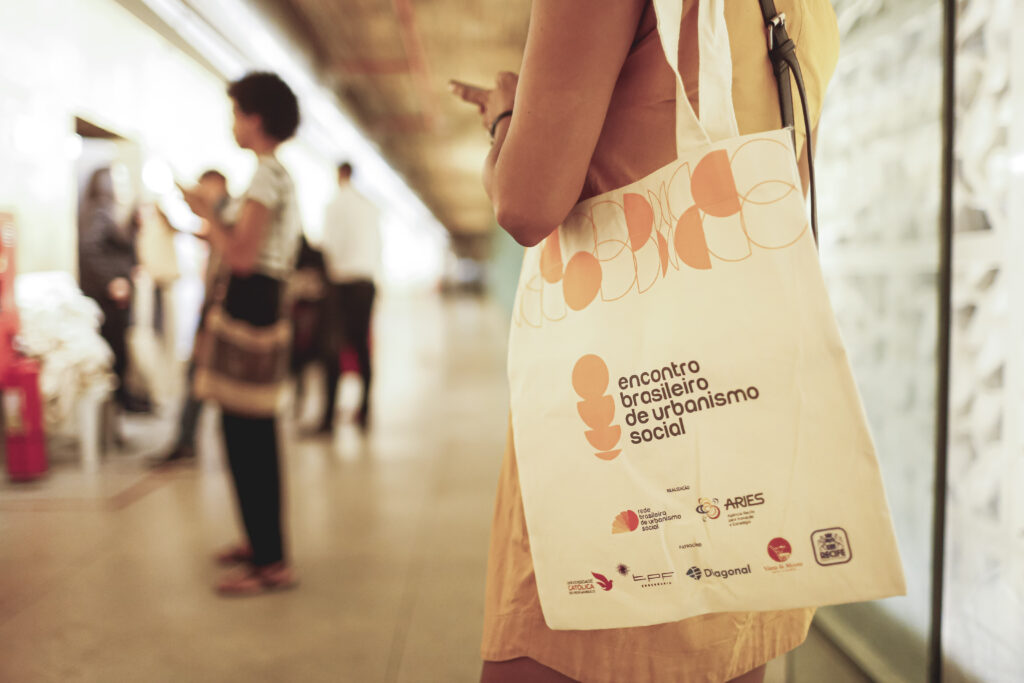
DAY 1: OPENING
The official opening was attended by Jorge Melguizo (former Secretary of Social Development and Citizen Culture of Medellín and international consultant in the area of Social and Human Development), Francisco Cunha (member of the board of directors of ARIES), Sérgio Farjado (former mayor of Medellín), Murilo Cavalcanti (Secretary of Citizen Security of Recife) Aline Cardoso (Secretary of Economic Development and Labor of the Municipality of São Paulo), Fernando Chucre (Secretary of Government Planning and Delivery of the Municipality of São Paulo), Kátia Mello (co-president of Diagonal), Tomás Alvim (coordinator of the Arq.Futuro de Cidades at Insper), among others.
In her opening speech, Kátia Mello saluted important names in Recife's public policies, such as Miguel Arraes, who inspired her partnership with Álvaro Jucá and the founding of Diagonal 33 years ago.
"Social urbanism wasn't called that, but we've been doing it ever since. We looked for opportunities with inspiring leaders throughout Brazil to show that it was possible to transform the lives of people living in favelas. Today, to give you, who believe in the transformative power of the peripheries, our Social Urbanism Guide is a great milestone for this knowledge to be disseminated around the world."
Kátia Mello
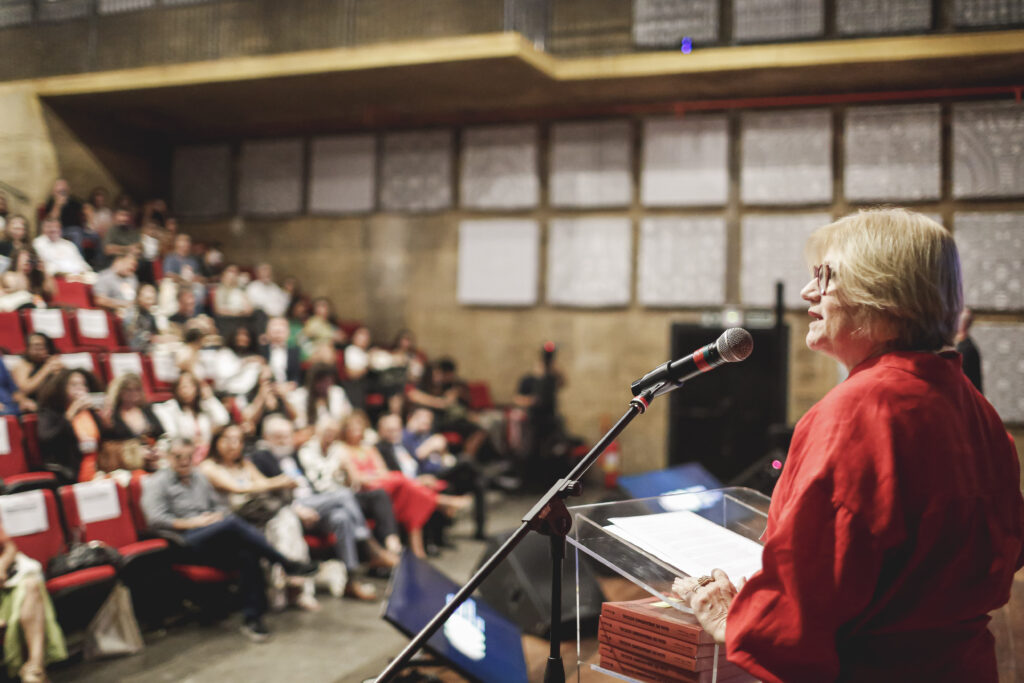
Tomás Alvim stressed the importance of integrated action, bringing together the public sector, the private sector and civil society. "When we founded Insper's Arq.Futuro Cities laboratory, we had a few premises: to have representatives from the government, civil society and the private sector. There is no transformation possible if these three players are not aligned, with a long-term vision of continuity, and above all, with a desire to generate transformation in people's lives, so that everyone can have a better quality of life and more opportunities."
Opening speech
Jorge Melguizo, an advocate of cities FOR people and a staunch critic of segregated cities, in his opening speech told the story of Medellín's Comuna 13, a shantytown where he lived until he was 24 and which was the target of military operations due to its poverty and violence.
"When Sergio Fajardo became mayor, we asked him what he was going to do about Medellín's Column 13, the neighborhood of violence, the neighborhood in which the national and municipal governments had decided to intervene militarily, in operations that left around 150 people missing, as well as dead and wounded. The answer was: we're going to change the way we intervene in these territories"says Melguizo.
The area was one of the most violent neighborhoods in Medellín, which in turn was one of the most violent cities in the world. However, the city government began to work differently, arguing that the neighborhood was not violent, but violated. It was a neighborhood that was a victim of violence. And for victim neighborhoods, it was necessary to embrace them and not bomb them. This neighbourhood needed to be embraced not only by the federal, state and municipal governments, but also by the entire private sector and society, in order to overcome the invisibility of the population that lived there.
"When we talk about social urbanism, "urbanism" seems to be the most important term and "social" the adjective to qualify it. However, the most important thing about social urbanism is the social. The physical works are secondary. This is a project to build the society we want, not just to build cities. Indifference is what kills us as a society. Building an antidote to indifference is fundamental in a project to build a society"says Melguizo.
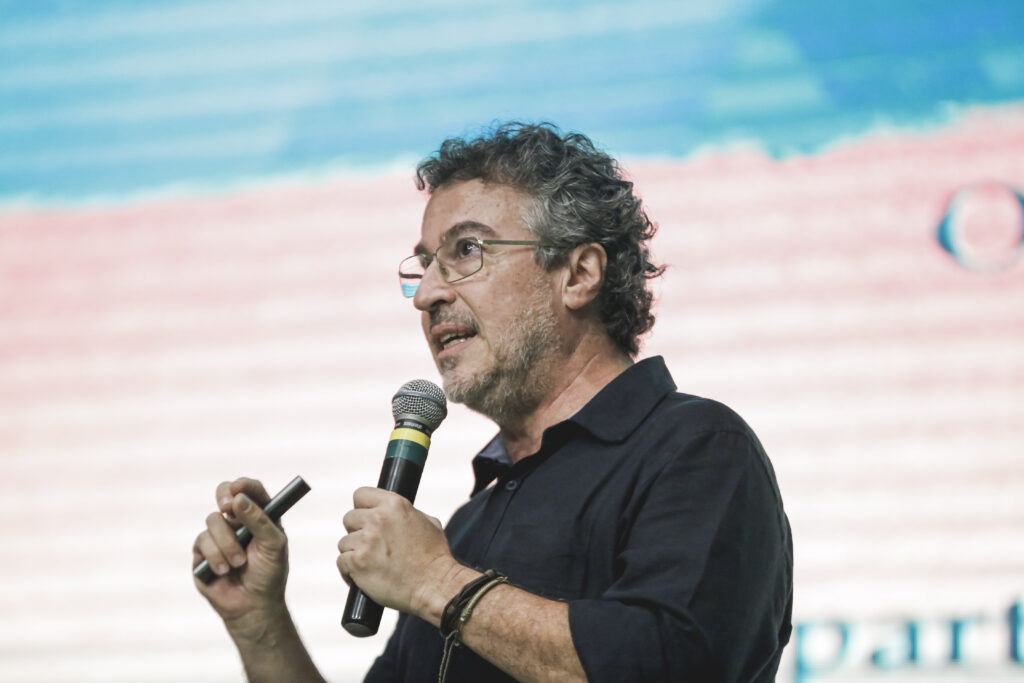
The former secretary of Medellín then lists a series of lessons he has learned from the Colombian city's projects, which have become an international model:
- Political will is needed. If there is political will, it's important to have good budgets. We need to change the way the public sector is managed.
- It's necessary to design medium- and long-term projects, but it's also necessary to look for quick results and victories in the short term.
- It is necessary to focus territorially, but it is also necessary to advance simultaneously in several territories, with integrated and articulated interventions.
- It is necessary to know, recognize, value and enhance what already exists in the community.
- The quality of public facilities must be a supreme condition in all physical and social projects
- We need to act in these projects as if we were disarming a bomb: a lot of knowledge of the explosive, a lot of patience, with a lot of tenderness and delicacy.
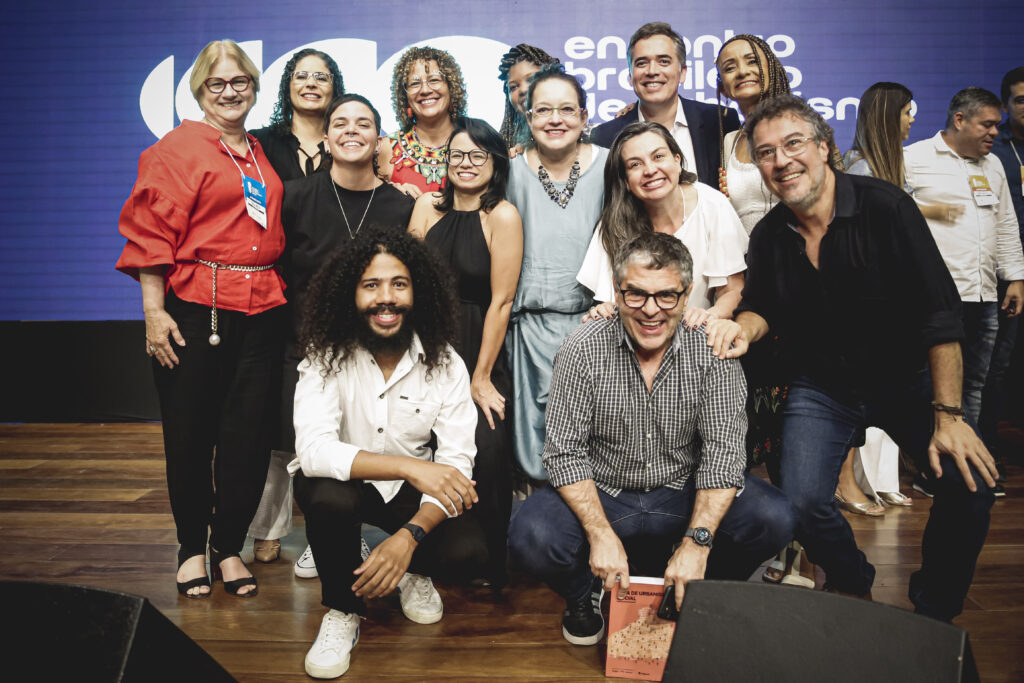
Watch the opening in full:
DAY 2
Master lecture 1: "The transformation of Medellín - Lessons learned"
In the first master lecture of the second day of the meeting, Sergio Fajardo told how the political powers conceived the interventions carried out in Medellín. Sergio was a teacher who believed in the power of education to generate social transformation. In December 1999, together with other social groups from different parts of the city (NGOs, academics, cultural professionals, entrepreneurs, etc.) who were frustrated and indignant at the lack of political action regarding the situation in the municipality, a civic movement for political participation was set up: the group was determined to run in the elections and win them in order to change Medellín's history.
"People from the periphery are kept away from opportunities by the wall of inequality. We need to create doors in this wall so that people can access opportunities. When we learn to respect, recognize, listen, with solidarity and empathy, doors are opened, dignity is generated and the best is brought out of each community and each individual"says Fajardo.
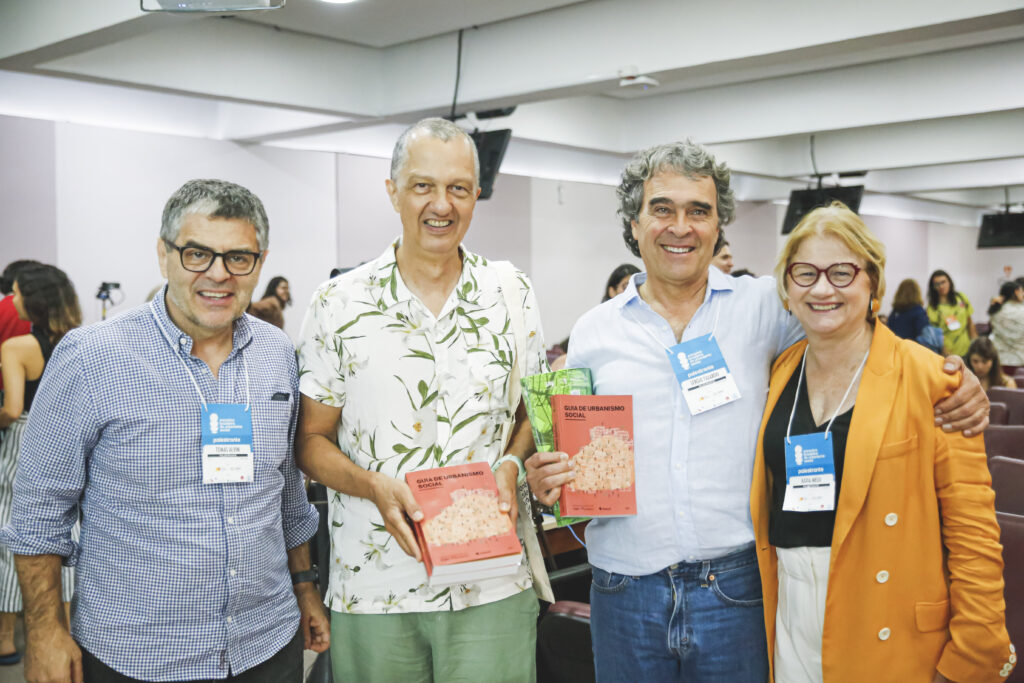
Find out more about the proposals and how the interventions were carried out in Medellín, watch it in full here.
Table "Housing and the right to decent housing"
One of the highlights of the second day of the meeting was the table of "Housing and the right to decent housing"The event was attended by Catarina Jucá (director of Impact Management at Diagonal), Jô Cavalcanti (national coordinator of the MTST and the first homeless person elected in Brazil by the Legislative Assembly of Pernambuco) and Maria Eduarda Médici Campos (coordinator of innovation, risks and housing policies at Pró-morar Recife).
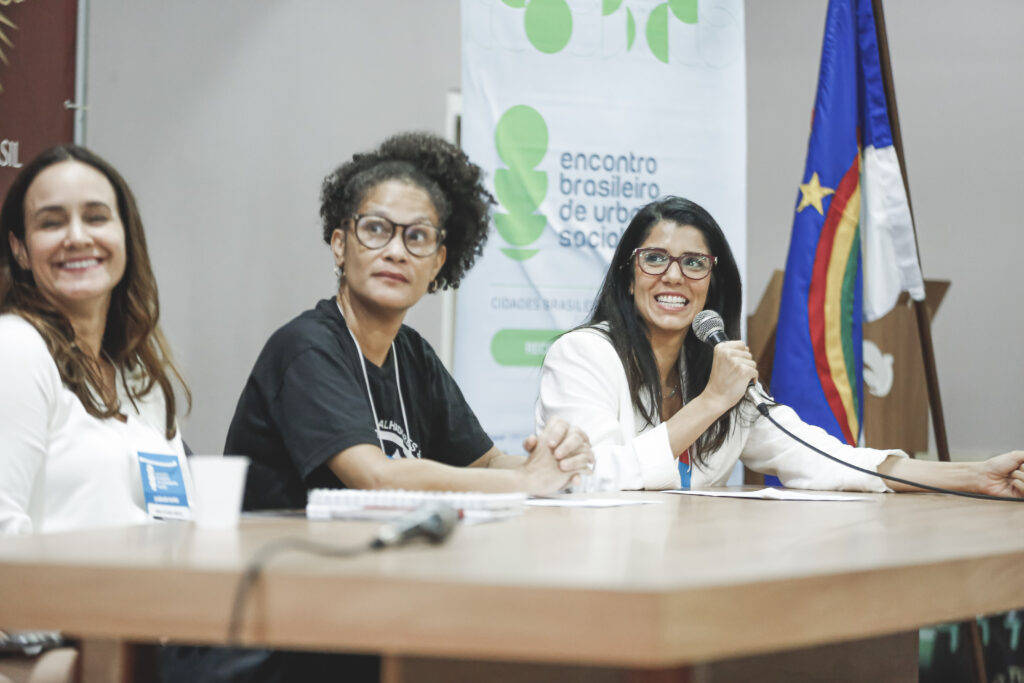
Catarina opened the discussion with alarming data: 53% of Recife's population lives in precarious settlements and informal areas. To reinforce the actions needed in this area, Catarina presented the case of the Integrated Sanitation Program in the Beberibe River Basin.
In 2014, in the Beberibe Basin, there were many families living on stilts in risky areas that flooded every year when it rained. The intervention removed the population living in risk areas, implemented a sanitation structure associated with the road structure and resettled the families in residential and housing units. In all, 29,000 families were impacted and 2,600 resettled, in 14 neighborhoods. In addition, the project developed a job and income generation agenda based on local vocations and the professionalization of activities already carried out, which promoted the population's engagement.
"Listening to people, believing in their power and generating popular participation is the essential point of any process that seeks to solve social problems"said Catarina.
Workshops
Various workshops on different topics, such as popular credit, entrepreneurship and income, early childhood and the environment, the urbanization process and its impact on solid waste generation, methodologies for evaluating and monitoring public policies in social urbanism, cities and the LGBTQIA+ population, climate change and environmental racism, the B system and economic development for the low-income population, among others.
Among the topics mentioned was the workshop "System B companies and economic development for the low-income population"conducted by Kátia Mello and Aline Cardoso.
The leaders addressed the issue of social inequalities and their consequences as central problems for contemporary societies. Associated with the climate crisis, these problems generate a social emergency, since the poorest are always the most affected. The workshop thus aimed to discuss the role of governments, companies and civil society in the search for integrated, multi-sectoral action in favor of sustainable development.
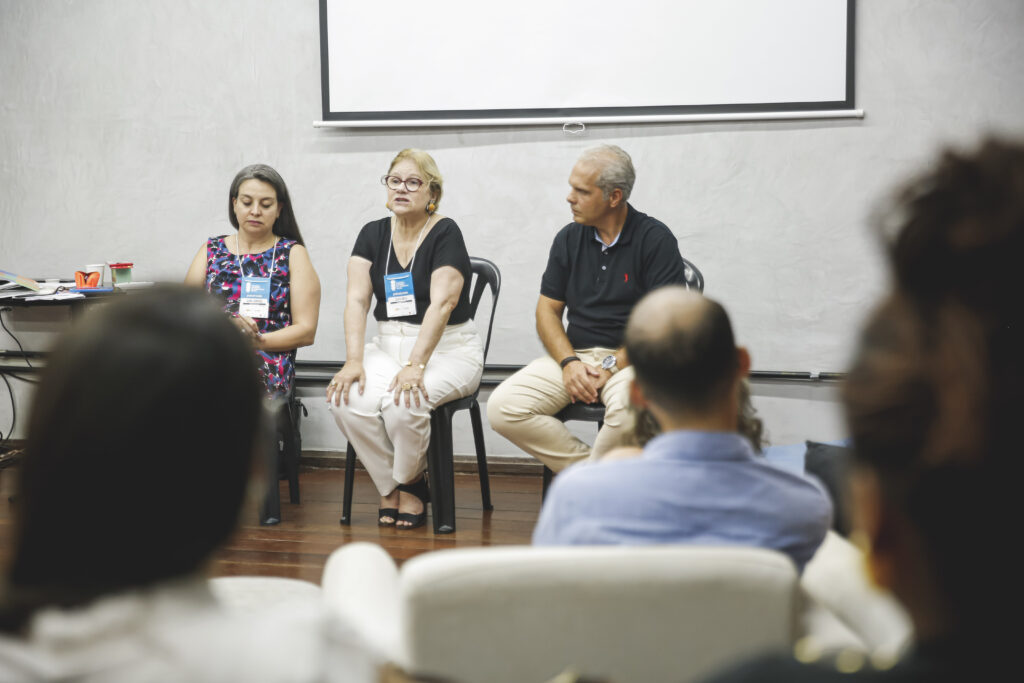
DAY 3
Master Lecture 2: "Socio-urban Integration in the City of Buenos Aires"
The master lecture on the third day of the meeting was given by Paula Mariano, Undersecretary for Social Integration and Habitat of the Autonomous City of Buenos Aires, who shared the process of social and urban integration work that began in 2016 in Buenos Aires.
"Our challenge was to implement a social policy that sought to solve structural poverty and offer equitable opportunities for the future, eliminating the barriers imposed by people's place of birth"says Paula.
See in full how social policy has had an impact on the quality of life of people living in low-income neighborhoods.
Table: Prospects for Public Security in Brazil
The third day of the meeting also highlighted the need to build safe cities for everyone. Gleide Ângelo, a police delegate and state deputy from Pernambuco, mediated the panel and opened the discussion. "If we continue to believe that the solution to public security problems is repression and we don't focus our efforts on prevention, we won't overcome violence. Violence is already the consequence and we need to tackle the cause," said Gleide.
With this opening, the panel presented projects that seek to transform people's lives and solve the problem of violence, without repression, through housing, food security, employability, education, fostering a sense of belonging and dignity for the population.
Tamires Sampaio, coordinator of PRONASCI - the National Program for Public Security with Citizenship, presented the objective of this initiative to the panel.
"PRONASCI is trying to subvert what public security is. Historically, public security in Brazil has been associated with the idea of maintaining order and preventing risks. However, the maintenance of social order in a country that is structurally unequal, racist and violent against a portion of the population, represents the maintenance of this violence and social inequalities. Security is not built with force alone, it needs to be built on the basis of guaranteeing rights and combating inequality, in other words, guaranteeing decent housing for the population, quality education, access to spaces for culture, leisure and living together, employability, food security, health and urban mobility. These spheres are also public security"Tamires explained.
Watch it in full.
DAY 4
Visits to the territories
The visit to the Island of God was undoubtedly one of the most eagerly awaited moments of the entire Social Urbanism Meeting. The visitors arrived on the island by boat and soon began the day's activities. The community was present to present the community tourism project, which was built on the contributions of the technical social work developed by Diagonal.
Visitors noticed the sustainability generated by the work carried out there, which took into account the demands and particularities of the community that lived there.
An interesting aspect of the meeting was the presence of a former resident of the island, who went through the resettlement process and explained that her family preferred to live in the housing complex around and very close to the island, in order to have better settlement conditions due to the size of her family, but that she continued to live close to her family, something that is very important in this process.
"On the way, we got to know the economic sustainability cooperative, the community radio station, had lunch at the restaurant run by Nalvinha, a community leader from Ilha de Deus, and saw the perpetuation of integral social work, which exemplifies what Social Urbanism is all about. It was very satisfying to present this to so many people interested in getting to know this project"" says Letícia Canonico, coordinator of the Brazilian Network of Social Urbanism and social project analyst here at Diagonal.
In addition to Ilha de Deus, the event also offered visits to Mais Vida nos Morros (Vila Arraes - Várzea and Morro da Conceição), Compaz Governador Eduardo Campos, Comunidade do Pilar and Porto Digital.
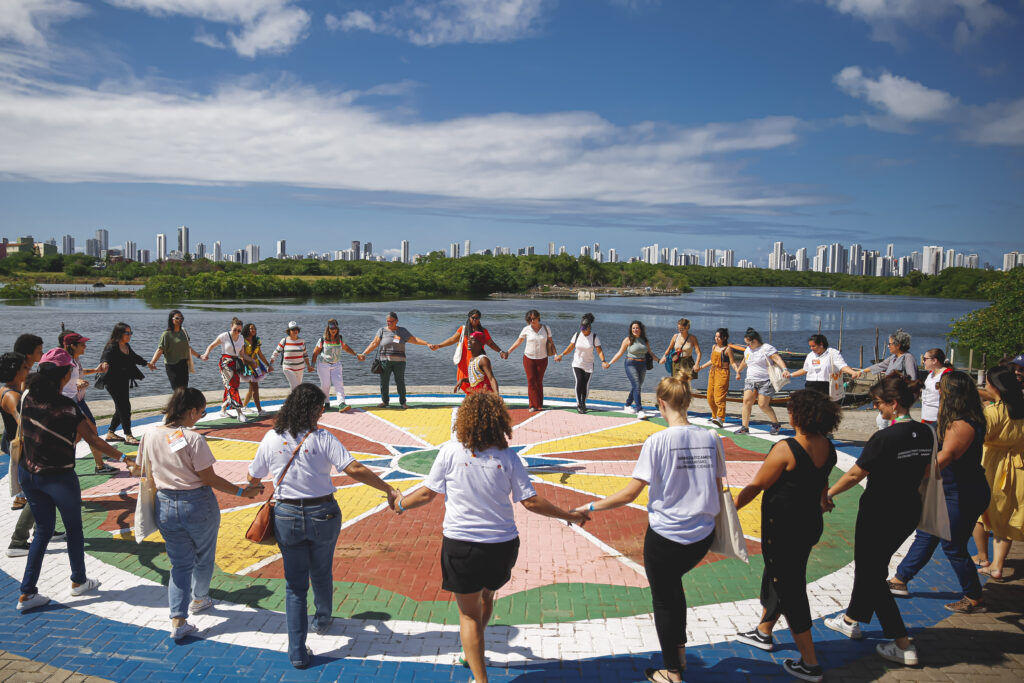
WATCH ALSO:
- Participatory diagnosis, integrated plans and projects
Who defines whether a public policy is right or wrong? The role of community actors and networks in defining local needs and the success of projects and policies
Click to watch
- Cities and Culture
The city as stage, artist and art: culture, leisure and urban education and the agents of transformation:
Click to watch
- Urban projects and social participation
Social participation as a technology and methodology for effective and successful urban projects
Click to watch
- Public Security: New Perspectives
Popular knowledge and conventional views: non-violent approaches to public security policies.
Click to watch
- Social Technologies
What we can learn from new social technologies: methodology, technique and space shared with the citizens involved.
Click to watch
